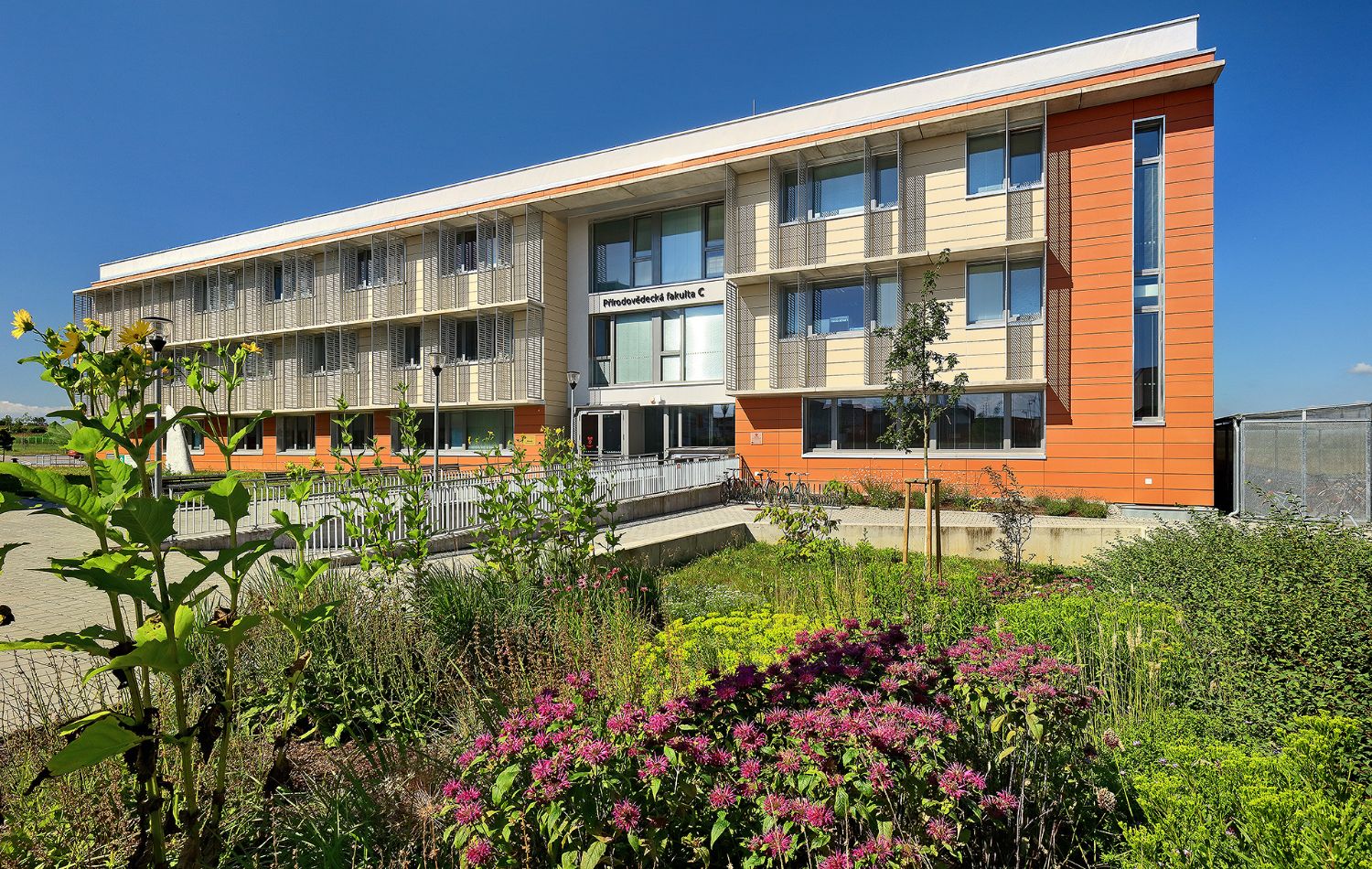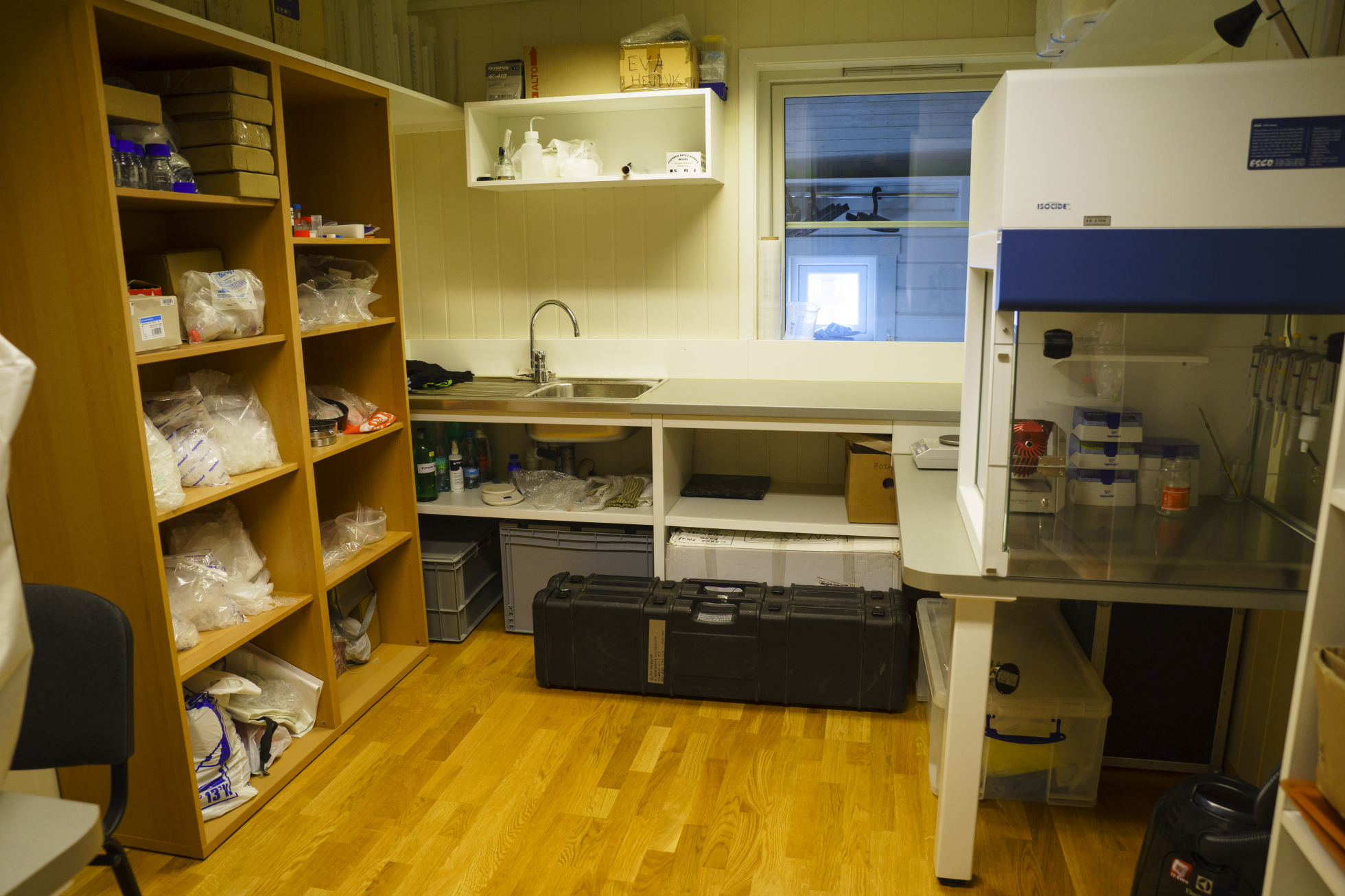Specialist boards of doctoral study programmes at FSci USB, update 10/27/2022
Available PhD programmes (expiration year of accreditation)
Aplikovaná fyzika / Applied Physics (2026)
Chairman: doc. RNDr. Vítězslav Straňák, Ph.D. (PřF JU)
prof. RNDr. Tomáš Polívka, Ph.D. (PřF JU)
doc. RNDr. Milan Předota, Ph.D. (PřF JU)
doc. RNDr. Petr Jelínek, Ph.D., (PřF JU)
doc. Dr. rer. nat. Ing. Jan Valdman, (PřF JU)
doc. RNDr. Ondřej Kylián, Ph.D. (MFF UK Praha)
prof. Ing. Martin Lísal, Ph.D., (ÚCHP AV ČR Praha)
prof. Ing. Petr Zeman, Ph.D., (FAV ZČU Plzeň)
Biochemie / Biochemistry (2028)
Chairwoman: prof. Mgr. Ivana Kutá Smatanová, Ph.D. (PřF JU)
doc. RNDr. Jiří Brynda, CSc. (ÚMG AV ČR Praha)
doc. Mgr. Radka Chaloupková, Ph.D. (ÚEB AV ČR Brno)
Mgr. Ivana Nemčovičová, Ph.D. (BRC SAV Bratislava)
RNDr. Pavlína Řezáčová, Ph.D. (ÚMG AV ČR Praha)
prof. RNDr. Bohdan Schneider, CSc. (Biocev Praha)
RNDr. Ján Štěrba, Ph.D. (PřF JU České Budějovice)
RNDr. Ľubica Urbániková, CSc. (ÚMB SAV Bratislava)
prof. RNDr. František Vácha, Ph.D. (PřF JU)
Biofyzika / Biophysics (2030)
Chairman: prof. RNDr. Tomáš Polívka, Ph.D. (PřF JU)
doc. Mgr. Karel Kubíček, Ph.D. (PřF MU, Brno)
doc. RNDr. Jiří Masojídek, CSc. (PřF JU, MBÚ AV ČR, Třeboň)
doc. RNDr. Peter Mojzeš, CSc. (MFF UK, Praha)
prof. RNDr. Ondřej Prášil, CSc. (PřF JU, MBÚ AV ČR, Třeboň)
doc. RNDr. Milan Předota, Ph.D. (PřF JU)
doc. RNDr. Jakub Pšenčík, Ph.D. (MFF UK, Praha)
prof. RNDr. Dalibor Štys, CSc. (FROV JU)
doc. Mgr. Roman Tůma, Ph.D. (PřF JU)
prof. RNDr. František Vácha, Ph.D. (PřF JU)
Biologie ekosystémů a ekologie / Ecosystem biology and Ecology (2028)
Chairwoman: doc. RNDr. Jana Jersáková, Ph.D. (PřF JU)
doc. Ing. MgA. David Boukal, Ph.D. (PřF JU, BC AV ČR ‐ ENTÚ Č. Budějovice)
RNDr. Tomáš Hájek Ph.D. (PřF JU, BÚ AV ČR Třeboň)
RNDr. Alica Chroňáková, Ph.D. (PřF JU, BC AV ČR- ÚPB Č. Budějovice)
doc. RNDr. Eva Kaštovská, Ph.D. (PřF JU)
prof. Ing. Jiří Kopáček, Ph.D. (PřF JU, BC AV ČR ‐ HBÚ Č. Budějovice)
RNDr. Ondřej Mudrák, Ph.D. (PřF JU, BÚ AV ČR Třeboň)
prof. Ing. Hana Šantrůčková, CSc. (PřF JU)
doc. RNDr. Petr Šmilauer, Ph.D. (PřF JU)
RNDr. Karel Tajovský, CSc. (BC AV ČR – ÚPB Č. Budějovice)
Botanika / Botany (2028)
Chairman: doc. Mgr. Jan Kučera, Ph.D.(PřF JU)
doc. RNDr. Jan Kaštovský, Ph.D.(PřF JU)
prof. RNDr. Jitka Klimešová, CSc. (BÚ AV ČR Průhonice)
doc. Mgr. Ondřej Koukol, Ph.D. (PřF UK)
doc. RNDr. Petr Kuneš, Ph.D. (PřF UK)
prof. RNDr. Jan Lepš, CSc. (PřF JU, BC AV ČR - ENTÚ Č. Budějovice)
prof. RNDr. Karel Prach, CSc. (PřF JU, BÚ AV ČR Třeboň)
doc. RNDr. Petr Sklenář, Ph.D. (PřF UK)
doc. Pavel Škaloud, Ph.D. (PřF UK Praha)
doc. RNDr. Marie Šmilauerová, Ph.D. (PřF JU)
doc. Ing. Milan Štech, Ph.D.(PřF JU)
doc. RNDr. Jakub Těšitel, Ph.D. (PřF MU Brno)
Entomologie / Entomology (2028)
Chairman: prof. RNDr. Nedvěd Oldřich, CSc. (PřF JU, BC AV ČR - ENTÚ Č. Budějovice)
prof. Ing. Ladislav Bocák, Ph.D. (Univerzita Palackého, Olomouc)
Mgr. Lukáš Čížek, Ph.D. (BC AV ČR - ENTÚ Č. Budějovice)
doc. Mgr. Pavel Drozd, Ph.D. (Ostravská univerzita)
prof. RNDr. Vojtěch Novotný, CSc. (PřF JU, BC AV ČR - ENTÚ Č. Budějovice)
doc. RNDr. Jan Růžička, Ph.D. (ČZU Praha)
doc. RNDr. Pavel Saska, Ph.D. (VURV Praha)
RNDr. Robert Tropek, Ph.D. (UK Praha, BC AV ČR - ENTÚ Č. Budějovice)
Hydrobiologie / Limnology (2028)
Chairman: prof. RNDr. Jaroslav Vrba, CSc. (PřF JU, BC AV ČR - HBÚ Č. Budějovice)
Mgr. Jindřiška Bojková, Ph.D. (PřF MU Brno)
doc. Ing. MgA. David Boukal, Ph.D. (PřF JU, BC AV ČR - ENTÚ Č. Budějovice)
doc. Ing. Josef Hejzlar, CSc. (PřF JU, BC AV ČR - HBÚ Č. Budějovice)
doc. Mgr. Jan Kaštovský, Ph.D. (PřF JU)
prof. Ing. Jiří Kopáček, Ph.D. (PřF JU, BC AV ČR - HBÚ Č. Budějovice)
doc. Mgr. Michal Koblížek, Ph.D. (PřF JU, MBÚ AV ČR, Třeboň)
prof. RNDr. Jan Kubečka, CSc. (PřF JU, BC AV ČR - HBÚ Č. Budějovice)
prof. RNDr. Adam Petrusek, Ph.D. (PřF UK Praha)
doc. RNDr. Martin Rulík, CSc. (PřF UP Olomouc)
prof. RNDr. Karel Šimek, CSc. (PřF JU, BC AV ČR - HBÚ Č. Budějovicoe)
doc. RNDr. Petr Znachor, Ph.D. (PřF JU, BC AV ČR - HBÚ Č. Budějovice)
Integrativní biologie / Integrative Biology (2028)
Chairman: doc. Mgr. Tomáš Doležal, Ph.D. (PřF JU)
doc. Hassan Hashimi, Ph.D. (PřF JU, PARÚ AV ČR)ý vvv
prof. RNDr. Julius Lukeš, CSc. (PřF JU, PARÚ AV ČR)
prof. RNDr. Ivo Šauman, CSc. (PřF JU, ENTÚ AV ČR)
RNDr. Ladislav Anděra, CSc. (ÚMG AV ČR)
prof. RNDr. Jan Tachezy, CSc. (PřF UK)
prof. RNDr. František Marec, CSc. (ENTÚ AV ČR)
RNDr. Petr Nguyen, Ph.D. (PřF JU)
prof. Ing. Miroslav Oborník, Ph.D. (PřF JU, PARÚ AV ČR)
RNDr. Jiří Macas, Ph.D. (ÚMBR AV ČR)
prof. Mgr. Marek Eliáš, Ph.D. (PřF OU)
doc. Alexander Bruce, Ph.D. (PřF JU)
prof. RNDr. Dalibor Kodrík, CSc. (PřF JU, ENTÚ AV ČR)
prof. RNDr. Marek Jindra, CSc. (PřF JU, ENTÚ AV ČR)
MVDr. Martin Anger, Ph.D. (CEITEC)
doc. Mgr. Martin Vácha, Ph.D. (PřF MUNI)
prof. Ing. Jiří Šantrůček, CSc. (PřF JU)
doc. Ing. Roman Sobotka, Ph.D. (PřF JU, MBÚ AV ČR)
prof. RNDr. Ondřej Prášil, Ph.D. (PřF JU, MBÚ AV ČR)
RNDr. Tomáš Hájek, Ph.D. (PřF JU, BÚ AV ČR)
RNDr. Lubomír Adamec, CSc. (BÚ AV ČR)
Ing. Martin Janda, Ph.D. (PřF JU)
RNDr. Jindřich Chmelař, Ph.D. (PřF JU)
prof. RNDr. Jan Kopecký, CSc. (PřF JU)
prof. RNDr. Libor Grubhoffer, CSc. (PřF JU, PARÚ AV ČR)
doc. RNDr. Daniel Růžek, Ph.D. (PřF JU, VÚVL AV ČR Brno, PARÚ AV ČR)
Prim. MUDr. Miroslav Verner (Nemocnice České Budějovice, PřF JU)
Parazitologie / Parasitology (2028)
Chairwoman: doc. RNDr. Eva Nováková, Ph.D. (PřF JU, PARÚ AV ČR)
doc. RNDr. Oleg Ditrich, CSc. (PřF JU, BC AV ČR - PARÚ Č. Budějovice)
doc. Mgr. Vladimír Hampl, Ph.D. (PřF UK Praha)
prof. RNDr. Václav Hypša, CSc. (PřF JU, BC AV ČR – PARÚ Č. Budějovice)
RNDr. Marie Jalovecká, Ph.D. (PřF JU, BC AV ČR – PARÚ Č. Budějovice)
prof. Ing. Martin Kváč, Ph.D. (ZF JU, České Budějovice)
prof. MVDr. David Modrý, Ph.D. (FVL Brno)
RNDr. Alena Panicucci Zíková, Ph.D. (PřF JU, BC AV ČR – PARÚ Č. Budějovice)
prof. RNDr. Tomáš Scholz, CSc. (PřF JU, BC AV ČR - PARÚ Č. Budějovice)
doc. RNDr. Jan Štefka, Ph.D. (PřF JU, PARÚ Č. Budějovice)
doc. RNDr. Jan Votýpka, Ph.D. (PřF UK Praha)
Zoologie / Zoology (2028)
Chairman: prof. Mgr. Radim Šumbera, Ph.D. (PřF JU)
prof. RNDr. Michal Horsák, Ph.D. (PřF MU Brno)
prof. RNDr. Miloš Macholán, CSc. (ÚŽFG Brno)
doc. RNDr. Josef Matěna, CSc. (PřF JU, BC AV ČR – HBÚ Č. Budějovice)
doc. Mgr. Pavel Munclinger, Ph.D. (PřF UK Praha)
prof. RNDr. Oldřich Nedvěd, CSc. (PřF JU, BC AV ČR - ENTÚ Č. Budějovice)
doc. RNDr. Martin Reichard, Ph.D. (ÚBO Brno)
doc. Mgr. Vladimír Remeš, Ph.D. (PřF UP Olomouc)
prof. RNDr. František Sedláček, CSc. (PřF JU)
RNDr. Petr Veselý, Ph.D. (PřF JU)
prof. RNDr. Jan Zrzavý, CSc. (PřF JU, BC AV ČR - ENTÚ Č. Budějovice)
Old programmes and fields of study, to which new students are no longer admitted (expiration year of accreditation)
Programme Biofyzika / Biophysics, field of study Biofyzika / Biophysics (2024)
Chairman: prof. RNDr. Tomáš Polívka, Ph.D. (PřF JU)
doc. Mgr. Karel Kubíček, Ph.D. (PřF MU, Brno)
doc. RNDr. Jiří Masojídek, CSc. (PřF JU, MBÚ AV ČR, Třeboň)
doc. RNDr. Peter Mojzeš, CSc. (MFF UK, Praha)
prof. RNDr. Ondřej Prášil, CSc. (PřF JU, MBÚ AV ČR, Třeboň)
doc. RNDr. Milan Předota, Ph.D. (PřF JU)
doc. RNDr. Jakub Pšenčík, Ph.D. (MFF UK, Praha)
prof. RNDr. Dalibor Štys, CSc. (FROV JU)
doc. Mgr. Roman Tůma, Ph.D. (PřF JU)
prof. RNDr. František Vácha, Ph.D. (PřF JU)
Programme Botanika / Botany, field of study Botanika / Botany (2024)
Chairman: doc. Mgr. Jan Kučera, Ph.D.(PřF JU)
prof. RNDr. Jan Kaštovský, Ph.D.(PřF JU)
prof. RNDr. Jitka Klimešová, CSc. (BÚ AV ČR Průhonice)
doc. Mgr. Ondřej Koukol, Ph.D. (PřF UK)
doc. RNDr. Petr Kuneš, Ph.D. (PřF UK)
prof. RNDr. Jan Lepš, CSc. (PřF JU, BC AV ČR - ENTÚ Č. Budějovice)
prof. RNDr. Karel Prach, CSc. (PřF JU, BÚ AV ČR Třeboň)
doc. RNDr. Petr Sklenář, Ph.D. (PřF UK)
doc. Pavel Škaloud, Ph.D. (PřF UK Praha)
doc. RNDr. Marie Šmilauerová, Ph.D. (PřF JU)
doc. Ing. Milan Štech, Ph.D.(PřF JU)
doc. RNDr. Jakub Těšitel, Ph.D. (PřF MU Brno)
Programme Biologie / Biology, field of study Biologie ekosystémů / Ecosystem biology (2024)
Chairwoman: doc. RNDr. Jana Jersáková, Ph.D. (PřF JU)
doc. Ing. MgA. David Boukal, Ph.D. (PřF JU, BC AV ČR ‐ ENTÚ Č. Budějovice)
RNDr. Tomáš Hájek Ph.D. (PřF JU, BÚ AV ČR Třeboň)
RNDr. Alica Chroňáková, Ph.D. (BC AV ČR ‐ ÚPB Č. Budějovice)
prof. Ing. Jiří Kopáček, Ph.D. (PřF JU, BC AV ČR ‐ HBÚ Č. Budějovice)
RNDr. Ondřej Mudrák, Ph.D. (PřF JU, BÚ AV ČR Třeboň)
prof. Ing. Hana Šantrůčková, CSc. (PřF JU)
prof. Ing. Miloslav Šimek, CSc. (PřF JU, BC AV ČR ‐ ÚPB Č. Budějovice)
doc. RNDr. Petr Šmilauer, Ph.D. (PřF JU)
RNDr. Karel Tajovský, CSc. (BC AV ČR – ÚPB Č. Budějovice)
Programme Biologie / Biology, field of study Entomologie / Entomology (2024)
Chairman: prof. RNDr. Nedvěd Oldřich, CSc. (PřF JU, BC AV ČR - ENTÚ Č. Budějovice)
prof. Ing. Ladislav Bocák, Ph.D. (Univerzita Palackého, Olomouc)
Mgr. Lukáš Čížek, Ph.D. (BC AV ČR - ENTÚ Č. Budějovice)
doc. Mgr. Pavel Drozd, Ph.D. (Ostravská univerzita)
prof. RNDr. Vojtěch Novotný, CSc. (PřF JU, BC AV ČR - ENTÚ Č. Budějovice)
doc. RNDr. Jan Růžička, Ph.D. (ČZU Praha)
doc. RNDr. Pavel Saska, Ph.D. (VURV Praha)
RNDr. Robert Tropek, Ph.D. (UK Praha, BC AV ČR - ENTÚ Č. Budějovice)
Programme Biologie / Biology, field of study Parazitologie / Parasitology (2024)
Chairwoman: doc. RNDr. Eva Nováková, Ph.D. (PřF JU, PARÚ AV ČR)
doc. RNDr. Oleg Ditrich, CSc. (PřF JU, BC AV ČR - PARÚ Č. Budějovice)
doc. Mgr. Vladimír Hampl, Ph.D. (PřF UK Praha)
prof. RNDr. Václav Hypša, CSc. (PřF JU, BC AV ČR – PARÚ Č. Budějovice)
RNDr. Marie Jalovecká, Ph.D. (PřF JU, BC AV ČR – PARÚ Č. Budějovice)
prof. Ing. Martin Kváč, Ph.D. (ZF JU, České Budějovice)
prof. MVDr. David Modrý, Ph.D. (FVL Brno)
RNDr. Alena Panicucci Zíková, Ph.D. (PřF JU, BC AV ČR – PARÚ Č. Budějovice)
prof. RNDr. Tomáš Scholz, CSc. (PřF JU, BC AV ČR - PARÚ Č. Budějovice)
doc. RNDr. Jan Štefka, Ph.D. (PřF JU, PARÚ Č. Budějovice)
doc. RNDr. Jan Votýpka, Ph.D. (PřF UK Praha)
Programme Biologie / Biology, field of study Infekční biologie / Infection Biology (2024)
Chairman: prof. RNDr. Jan Kopecký, CSc. (Přf JU, BC AV ČR – PARÚ Č. Budějovice)
doc. RNDr. Oleg Ditrich, CSc. (PřF JU, Č. Budějovice)
MUDr. Jozef Filka, Ph.D. (ZSF JU, Č. Budějovice)
prof. RNDr. Libor Grubhoffer, CSc. (PřF JU, BC AV ČR – PARÚ Č. Budějovice)
RNDr. Jindřich Chmelař, Ph.D. (PřF JU)
Prim. MUDr. Václav Chmelík, (Nemocnice Č. Budějovice a.s.)
doc. MUDr. Květoslava Kotrbová, Ph.D. (ZSF JU Č. Budějovice)
Doc. MUDr. Ladislav Machala, Ph.D. (3. LF UK Praha)
doc. RNDr. Miroslav Šíp, DrSc. ( ZSF JU, Č. Budějovice)
Prim. MUDr. Miroslav Verner (Nemocnice Č. Budějovice)
doc. RNDr. Jan Votýpka, Ph.D. (PřF UK, Praha)
Programme Biology, field of study Hydrobiologie / Hydrobiology (2024)
Chairman: prof. RNDr. Jaroslav Vrba, CSc. (PřF JU, BC AV ČR - HBÚ Č. Budějovice)
Mgr. Jindřiška Bojková, Ph.D. (PřF MU Brno) )
doc. Ing. MgA. David Boukal, Ph.D. (PřF JU, BC AV ČR - ENTÚ Č. Budějovice) )
doc. Ing. Josef Hejzlar, CSc. (PřF JU, BC AV ČR - HBÚ Č. Budějovice) )
prof. Mgr. Jan Kaštovský, Ph.D. (PřF JU) )
prof. Ing. Jiří Kopáček, Ph.D. (PřF JU, BC AV ČR - HBÚ Č. Budějovice) )
doc. Mgr. Michal Koblížek, Ph.D. (PřF JU, MBÚ AV ČR, Třeboň) )
prof. RNDr. Jan Kubečka, CSc. (PřF JU, BC AV ČR - HBÚ Č. Budějovice) )
prof. RNDr. Adam Petrusek, Ph.D. (PřF UK Praha) )
doc. RNDr. Martin Rulík, CSc. (PřF UP Olomouc) )
prof. RNDr. Karel Šimek, CSc. (PřF JU, BC AV ČR - HBÚ Č. Budějovice) )
doc. RNDr. Petr Znachor, Ph.D. (PřF JU, BC AV ČR - HBÚ Č. Budějovice)
Programme Fyziologie a imunologie/ Physiology and Immunology, field of study Fyziologie a vývojová biologie/ Physiology and Developmental Biology (2024)
Chairman: Prof. Ing. Jiří Šantrůček, CSc. (PřF JU)
RNDr. Lubomír Adamec, CSc. (BU AV ČR Průhonice)
doc. Ing. Martin Flajšhans, Dr.rer.agr. (VÚRH JU, Vodňany)
prof. RNDr. Jan Gloser, DrSc. (PřF MU Brno)
RNDr. Tomáš Hájek, Ph.D. (PřF JU)
RNDr. Blanka Kalinová, CSc. (ÚOCHB Praha)
prof. RNDr. Dalibor Kodrík, CSc. (BC AV ČR – EntÚ Č. Budějovice, PřF JU)
prof. Ing. Vladimír Košťál, CSc. (BC AV ČR – EntÚ Č. Budějovice)
Mgr. Jan Okrouhlík, Ph.D. (BC AV ČR – EntÚ Č. Budějovice)
prof. RNDr. Ondřej Prášil, Ph.D. ( BC AV ČR - ÚMBR Č. Budějovice)
prof. RNDr. František Sehnal, CSc. (BC AV ČR – EntÚ Č. Budějovice, PřF JU)
prof. RNDr. František Vácha, Ph.D. (PřF JU)
doc. Mgr. Martin Vácha, Ph.D. (PřF MU Brno)
doc. RNDr. Stanislav Vybíral, CSc. (PřF UK Praha)
Programme Molekulární a buněčná biologie/ Molecular and Cell Biology,
field of study Molekulární a buněčná biologie a genetika/ Molecular and Cell Biology and Genetics (2024)
Chairman: doc. Mgr. Tomáš Doležal, Ph.D. (PřF JU)
RNDr. Ladislav Anděra, CSc. (ÚMG AV ČR)
prof. Mgr. Marek Eliáš, Ph.D. (PřF OU)
prof. RNDr. Libor Grubhoffer, CSc. (PřF JU, BC AV ČR – PARÚ Č. Budějovice)
doc. Hassan Hashimi, Ph.D. (PřF JU, PARÚ AV ČR)
prof. RNDr. Julius Lukeš, CSc. (PřF JU, PARÚ AV ČR)
RNDr. Jiří Macas, Ph.D. (ÚMBR AV ČR)
prof. RNDr. František Marec, CSc. (ENTÚ AV ČR)
RNDr. Petr Nguyen, Ph.D. (PřF JU)
prof. Ing. Miroslav Oborník, Ph.D. (PřF JU, PARÚ AV ČR)
doc. Ing. Roman Sobotka, Ph.D. (PřF JU, MBÚ AV ČR)
prof. RNDr. Ivo Šauman, CSc. (PřF JU, ENTÚ AV ČR)
prof. RNDr. Jan Tachezy, CSc. (PřF UK)
Programme Zoologie / Zoology, field of study Zoologie / Zoology (2024)
Chairman: prof. Mgr. Radim Šumbera, Ph.D. (PřF JU)
prof. RNDr. Michal Horsák, Ph.D. (PřF MU Brno)
prof. RNDr. Miloš Macholán, CSc. (ÚŽFG Brno)
doc. RNDr. Josef Matěna, CSc. (PřF JU, BC AV ČR – HBÚ Č. Budějovice)
doc. Mgr. Pavel Munclinger, Ph.D. (PřF UK Praha)
prof. RNDr. Oldřich Nedvěd, CSc. (PřF JU, BC AV ČR - ENTÚ Č. Budějovice)
doc. RNDr. Martin Reichard, Ph.D. (ÚBO Brno)
doc. Mgr. Vladimír Remeš, Ph.D. (PřF UP Olomouc)
prof. RNDr. František Sedláček, CSc. (PřF JU)
RNDr. Petr Veselý, Ph.D. (PřF JU)
prof. RNDr. Jan Zrzavý, CSc. (PřF JU, BC AV ČR - ENTÚ Č. Budějovice)









